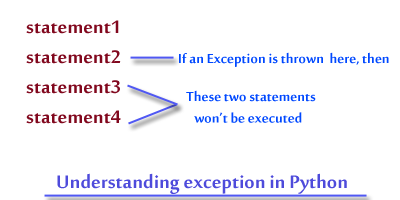Advertisement

Advertisement
| Exception Class | Description |
|---|---|
| BaseException | This is a base class for all built-in exceptions. |
| KeyboardInterrupt | This type of exception is raised when a user pressed CTRL+C to interrupt a program's execution. |
| SystemExit | This type of exception is raised by sys.exit() function. |
| Exception | This is a base class for all the built-in exceptions, except system exiting exceptions. User defined exceptions should be derived from this class. |
| StandardError | This is a base class for all the built-in exceptions except StopIteration, GeneratorExit, KeyboardInterrupt and SystemExit classes. |
| BufferError | This type of exception is raised during failure of buffer related processing. |
| ArithmeticError | This is a base class for all built-in exceptions that are raised for arithmetic errors |
| FloatingPointError | This type of exception is raised during a floating-point error. |
| OverflowError | This type of exception is raised when result of an arithmetic expression is too large to be displayed. |
| ZeroDivisionError | This type of exception is raised when a number is divided by a zero. |
| AssertionError | This type of exception is raised during the failure of an assert statement. |
| AttributeError | This type of exception is raised during the failure of an attribute reference or assignment. |
| EnvironmentError | This type of exception can occur outside the Python environment system. |
| IOError | This type of exception is raised during the failure of an I/O operation. |
| OSError | This type of exception is raised during an operating system related error. |
| EOFError | This type of exception is raised when EOF(end-of-file) is reached during the call to one of the built-in functions - input() or raw_input() functions, without reading any data. |
| ImportError | This type of exception is raised during the failure of import statement to find and import a module's definition. |
| LookupError | This is a base class for all exceptions raised due an invalid key or index used to mapping. |
| IndexError | This type of exception is raised when a searched index is not found or is out-of-range. |
| KeyError | This type of exception is raised when a searched key is not found. |
| MemoryError | This type of exception is raised when an operation runs out of memory. |
| NameError | This type of exception is raised when a local or global name is not found or its value is not defined. |
| UnboundLocalError | This type of exception is raised when a local variable is referenced in a function but there is no value bound to it. |
| RuntimeError | This type of exception is raised when a detected error does not fall in any category. |
| NotImplementedError | This type of exception is raised when a function of abstract class is not implemented in a derived class. |
| SyntaxError | This type of exception is raised when there is a syntax error in Python's script/program. |
| IndentationError | This type of exception is raised during an erroneous indentation in a program. |
| TabError | This type of exception is raised during an incorrect use of tab and spaces in indentation. |
| SystemError | This type of exception is raised when Python's interpreter find an internal error but still does not quit or exit. |
| TypeError | This type of exception is raised when an operation or function is executed over an object of an invalid data type. |
| ValueError | This type of exception is raised when an operation function recieves an argument whose value does not match with its specified type. |
| UnicodeError | This type of exception is raised during an error in Unicode coding/decoding. |
| KeyError | This type of exception is raised when a searched key is not found. |
Advertisement
Advertisement
Please check our latest addition
C#, PYTHON and DJANGO
Advertisement